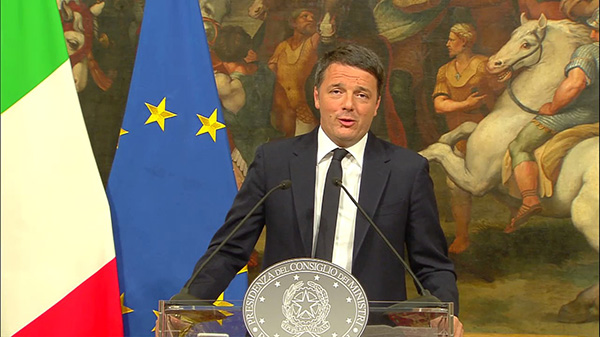
Despite the no camp winning the referendum on constitutional reform, it would be a mistake to say that Italy has voted against Europe, even though it may have European consequences, albeit more restricted than many pessimists have claimed. It was not a victory for populism – if anything, it ran counter to the populism as embodied by the Five Star Movement led by Beppe Grillo (which is quite different from Podemos in Spain). Because although he and his followers campaigned against, what many other advocates of “no” feared was that the constitutional reform sponsored by the prime minister, Matteo Renzi – in conjunction with the already-enacted change in electoral law, which awards the victor an extra allocation of seats – would place excessive power in the hands of the Five Star Movement should it win the next election, a possibility that cannot be ruled out. In other words there was an uneasy alliance comprising both Grillo supporters and opponents, sustained by Renzi’s political errors.
Renzi, who has never won an election as a candidate – he did not run in the European election – and who secured power via manoeuvres in his own party, miscalculated. Despite having his base in Florence, he is not a particularly Florentine politician. He alienated a section of his Democratic Party, particularly those who came from the former Communist Party, and the much-needed support of Silvio Berlusconi, who still carries considerable influence, when contrary to Berlusconi’s wishes he chose Sergio Mattarella as President of the Republic, a post that wields much more power than is generally appreciated. In direct opposition he had the Five Star Movement, which is populist but more anti-state than left-wing, the right-wing and anti-immigration Northern League and, in general, those that rail against “the elite” (la casta was an expression coined in Italy). Renzi’s reform did not secure a two thirds majority in parliament, hence his decision to submit the issue directly to a referendum.
The main proposal of the reform was to slim down and reduce the power of the Senate, doing away with a perfectly balanced bicameral system, and to shift power from the regions and town halls back towards the centre. It threatened the balance of power that was established in the wake of World War II and Mussolini’s fascism in order to prevent the emergence of another such “strong-man” leader. One section of no voters was not necessarily opposed to Renzi, but rather his institutional reforms. Renzi also committed the error of turning the referendum into a plebiscite on his leadership by promising to resign if he lost. In light of the results, and the more than nine-point margin with which the no camp won, it remains to be seen what his future holds now that he has resigned. The decision rests with Mattarella. Renzi’s administration was the third consecutive non-elected government in Italy, after those of Mario Monti, who supported the no camp, and Enrico Letta. He may be quickly forgotten, or not. Italy is always full of surprises. The most reasonable – although not necessarily the most probable – next step would be fresh elections, but who knows what the outcome of those might be.
Renzi’s resignation raises the question of the impact on Europe, with an Italy that has needed in-depth economic reforms for years, which will now have to wait even longer: employment reform after a half-hearted step in the right direction, financial reform – with a weakened banking system and eight struggling banks badly in need of restructuring, something that may be of more immediate concern to the rest of the Eurozone – the modernisation of industry, which invests little in R&D, and a very backward digital programme, reform of public finances bedevilled by runaway debt, etc. In this sense it appears to be a result that runs counter to Europe, although it was not inherently a vote aimed against Europe.
In the wake of the Italian result, and the issue of the government in Spain having been settled, albeit with the parliamentary arithmetic obliging pacts to be struck, Spain could once again put itself forward, if it is capable of doing so, as the dependable partner in the south, more necessary and with greater influence after the victory of Brexit in the United Kingdom.
In neighbouring Austria meanwhile, the victory of the independent Green, Alexander Van der Bellen, in the rerun of the presidential election over Norbert Hofer, the xenophobic and anti-European member of the Freedom Party, brings relief and has prevented the extreme right from claiming what would be its first leadership of an EU state. But the result should not obscure the fact that the traditional parties, the Christian Democrats and the Social Democrats, which have alternated in power in Austria since 1945, were swept away in the first round. Men and the working classes voted predominantly for Hofer, who claimed more than 45% of the ballot, while women, young people and the retired tended to support Van der Bellen. This is something that is taking place in many countries, including the US. Throughout Europe (and the West), voters are in a rebellious mood and societies are mutating. It remains to be seen how far this goes in the crucial presidential and parliamentary elections in France and the general election in Germany next year. This last weekend we have witnessed a reaction against so-called anti-European populism in two countries, but in such a way that suggests the end of the orthodoxy that has dominated European life in recent decades.


